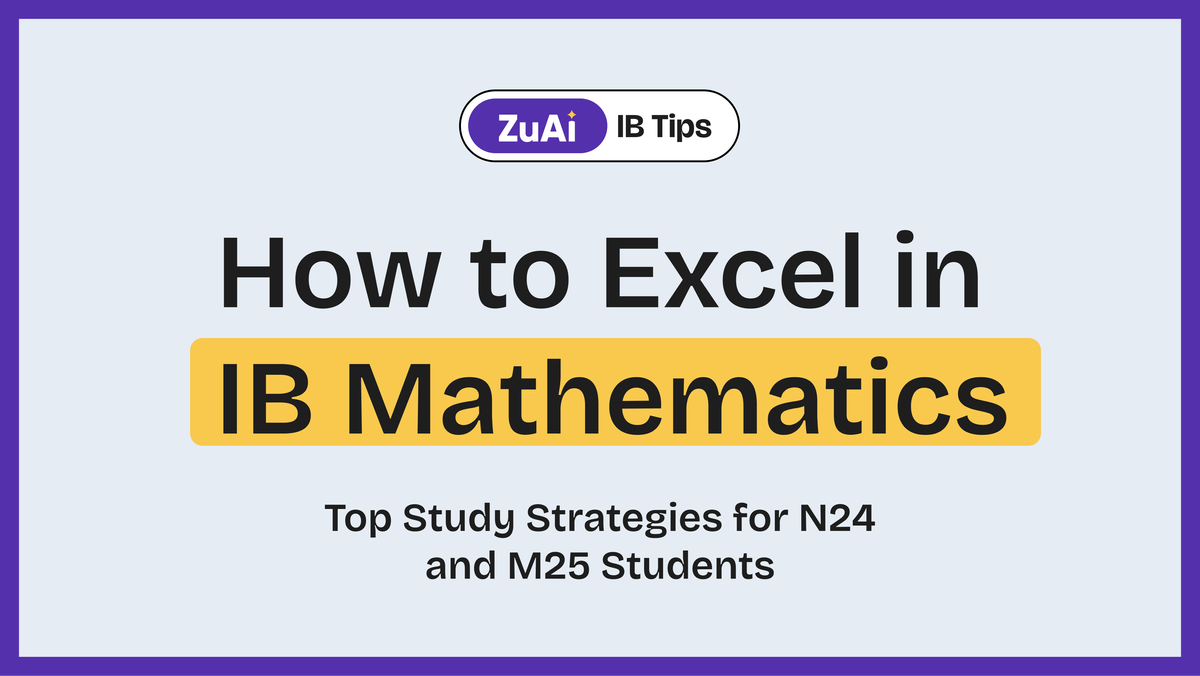How to Excel in IB Mathematics: Top Study Strategies for N24 and M25 Students

Author: Maria Jenkins, IB Mathematics Educator and Tutor
Introduction
IB Mathematics is known for its rigor and complexity, and students often find it one of the most challenging subjects in the IB Diploma Programme. Whether you're in Mathematics: Analysis and Approaches (AA) or Applications and Interpretation (AI), success requires more than just attending classes and doing homework — it demands smart study strategies and thorough preparation.
In this guide, we'll explore effective strategies to help you excel in IB Mathematics, whether you're preparing for the N24 or M25 exam sessions. By following these tips, you'll be better equipped to tackle challenging concepts, perform well in exams, and manage your Internal Assessment (IA).
Understanding the IB Mathematics Curriculum
Before diving into study techniques, it's essential to have a good grasp of the IB Mathematics curriculum. Both Mathematics: AA and Mathematics: AI have distinct focuses, and understanding these differences is crucial to excelling in your chosen course.
- Mathematics: Analysis and Approaches (AA): This course emphasizes mathematical theory and requires strong analytical and abstract thinking skills. It’s ideal for students interested in subjects like engineering, physics, and computer science.
- Mathematics: Applications and Interpretation (AI): This course focuses on real-world applications of mathematics, using statistics, modeling, and technology. It’s suitable for students pursuing fields such as social sciences, business, and the arts.
Pro Tip: Make sure to check the official IB Mathematics syllabus for your course to understand the specific topics you need to cover and how they will be assessed in your final exams.
Step 1: Create a Solid Study Plan
Success in IB Mathematics depends on regular practice and review. Creating a study plan is the first step toward ensuring you stay on track throughout the year.
How to Create a Study Plan:
- Break it down by topic: Divide your study schedule according to the topics in your syllabus (e.g., calculus, algebra, trigonometry, statistics).
- Set specific goals: Focus on one topic or concept per session, such as mastering integration techniques or understanding probability distributions.
- Allocate regular practice time: Set aside time each week for dedicated practice of IB Mathematics problems.
- Incorporate revision sessions: Don’t just move on after learning a new concept — regularly revisit old topics to ensure you retain the information.
Pro Tip: Use apps like Google Calendar or My Study Life to organize your study sessions and set reminders for important deadlines, such as IA submissions or upcoming exams.
Step 2: Mastering Key Concepts
To do well in IB Mathematics, you need to understand key mathematical concepts rather than just memorizing formulas. Deep understanding allows you to apply concepts in unfamiliar situations — a critical skill for success in IB exams.
Tips for Mastering Concepts:
- Use visual aids: Draw diagrams, graphs, and charts to help visualize complex mathematical ideas, especially for calculus, geometry, and trigonometry.
- Understand the “why”: Don’t just memorize formulas — understand why they work. For example, when studying differentiation, understand why it helps find rates of change rather than just memorizing the rules.
- Teach someone else: Explaining mathematical concepts to a friend or family member can deepen your understanding and highlight areas where you may need to improve.
Step 3: Practice with Past Papers
Practicing with past IB Mathematics exam papers is one of the most effective ways to prepare for your final exams. Past papers give you a feel for the types of questions that will be asked and help you improve your problem-solving skills under time pressure.
How to Use Past Papers Effectively:
- Start early: Don’t wait until the last minute to start using past papers. Begin practicing several months before your exams.
- Simulate exam conditions: When working on past papers, time yourself and work in a quiet environment to simulate real exam conditions.
- Review mark schemes: After completing a past paper, review the official IB mark scheme to understand how examiners award points. This will help you learn how to structure your answers for maximum marks.
Pro Tip: Focus on understanding how to approach unfamiliar problems, as IB exams often include questions that test your ability to apply concepts in new ways.
Step 4: Tackle Your Internal Assessment (IA)
The Internal Assessment (IA) for IB Mathematics is worth 20% of your final grade and gives you the opportunity to explore a mathematical topic of your choice. The IA requires both creativity and analytical thinking, and it's crucial to choose a topic that you find interesting and feasible to investigate.
Tips for a Successful IA:
- Choose a topic that excites you: Whether it’s mathematical modeling, investigating patterns, or exploring statistics, pick a topic that holds your interest.
- Plan your IA carefully: Break down your IA into sections, such as introduction, methodology, data collection, analysis, and conclusion.
- Use reliable data: If your IA involves data collection (e.g., for statistical analysis), make sure your data is accurate and relevant to your research question.
- Consult your teacher: Regularly check in with your teacher for feedback on your IA. They can provide guidance on structure, analysis, and presentation.
Example IA Topic: Investigating the correlation between rainfall and crop yield using statistical regression analysis.
Step 5: Use Technology to Your Advantage
IB Mathematics encourages the use of technology, particularly graphing calculators, as a tool for solving complex problems. Knowing how to use your graphing calculator effectively can save time and help you tackle difficult questions.
How to Use Technology in IB Mathematics:
- Learn calculator shortcuts: Become familiar with your calculator's functions, such as plotting graphs, solving equations, and performing statistical analyses.
- Use graphing software: Tools like GeoGebra or Desmos can help you visualize functions, derivatives, and integrals, making it easier to understand complex topics.
- Practice with technology: Regularly practice using your calculator or software so that you're confident with it during exams.
Pro Tip: Don’t rely solely on technology — make sure you understand the underlying mathematical concepts, so you’re not dependent on the calculator to solve every problem.
Bonus Tip: AI app for IB Exams = ZuAI
It's the ultimate AI app designed to help your child excel in their IB exams. As a parent, you want the best for your child, and so do we.
ZuAI provides personalized study support, practice questions, and detailed explanations tailored specifically to the IB curriculum.
Think of it as a smart tutor who understands your child’s unique learning needs, helping them tackle challenging subjects with confidence.
With ZuAI, you can feel reassured knowing your child is getting the extra help they need to succeed and build a bright future.
We genuinely care about your child's success and are here to support them every step of the way.

Looking for free solutions to previous year's question papers? Check out ZuAI's YouTube channel.
FAQ Section
Q1: How much time should I dedicate to studying IB Mathematics each week?
A: Aim to study IB Mathematics for at least 6-8 hours per week, depending on your strengths and the difficulty of the topics. Consistent practice is key to success.
Q2: Can I use any topic for my IB Mathematics IA?
A: You should choose a topic that aligns with the IB syllabus and allows for deep mathematical analysis. Make sure the topic is neither too broad nor too narrow and can be explored within the word limit.
Q3: How do I handle difficult topics in IB Mathematics?
A: Break difficult topics into smaller, manageable sections. Focus on understanding the fundamentals before tackling more complex problems. Don’t hesitate to ask your teacher for help or use online resources like Khan Academy or Revision Village.
Q4: Should I memorize formulas for the IB Mathematics exam?
A: While memorizing key formulas is important, focus on understanding how and when to apply them. In the exam, knowing which formulas to use for specific problems is just as important as recalling them.
Q5: How can I improve my problem-solving speed for the IB exams?
A: Practice regularly with timed past papers to improve both speed and accuracy. Break down problems into steps and avoid spending too much time on any single question.
Conclusion
Excelling in IB Mathematics requires a combination of regular practice, deep understanding of concepts, and smart exam strategies. By following these tips — from creating a solid study plan to practicing with past papers and mastering your IA — you'll be well-prepared for success in the N24 and M25 sessions. Stay consistent, ask for help when needed, and remember that the key to IB Mathematics is understanding, not just memorization.
Good luck on your IB Mathematics journey!
